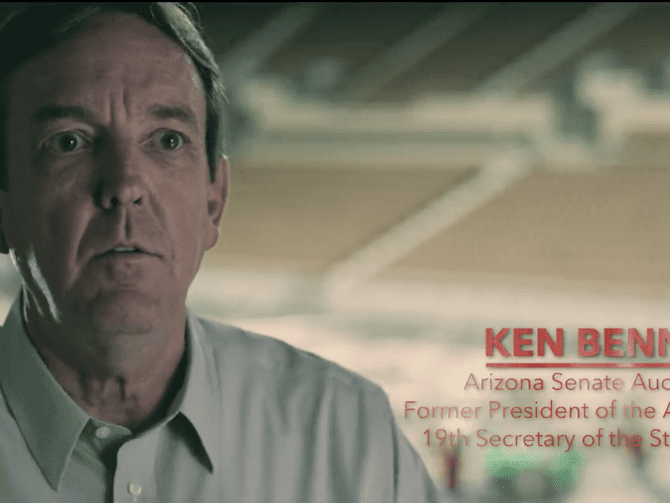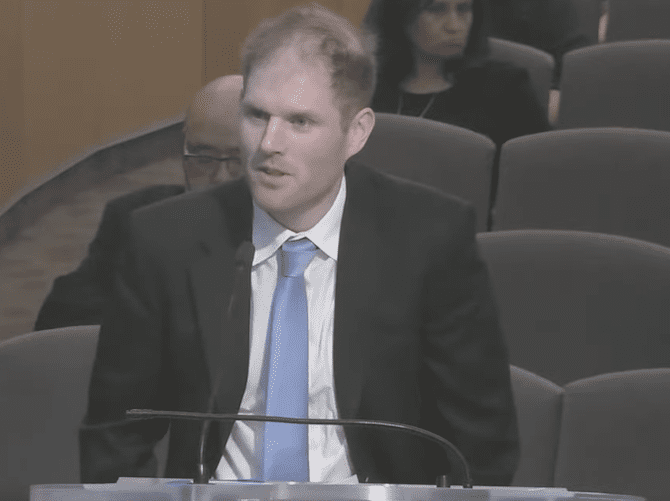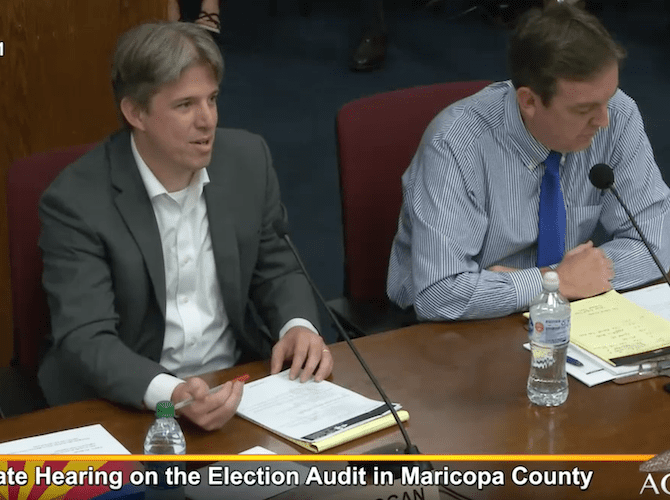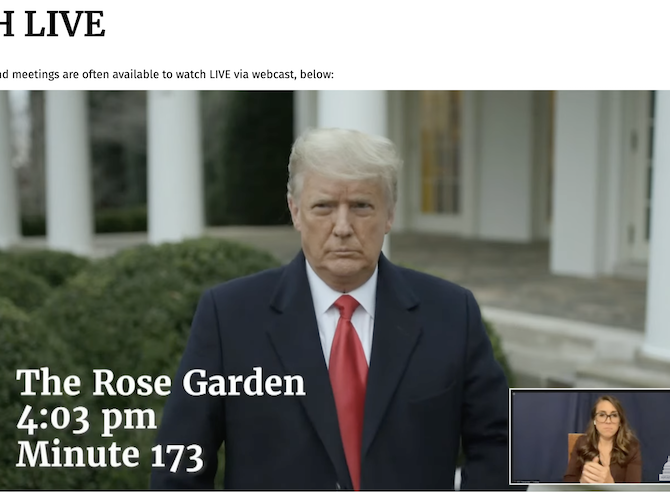Republicans in Arizona Senate Hope to Expand 2020 Audit as Justice Department May Shut It Down
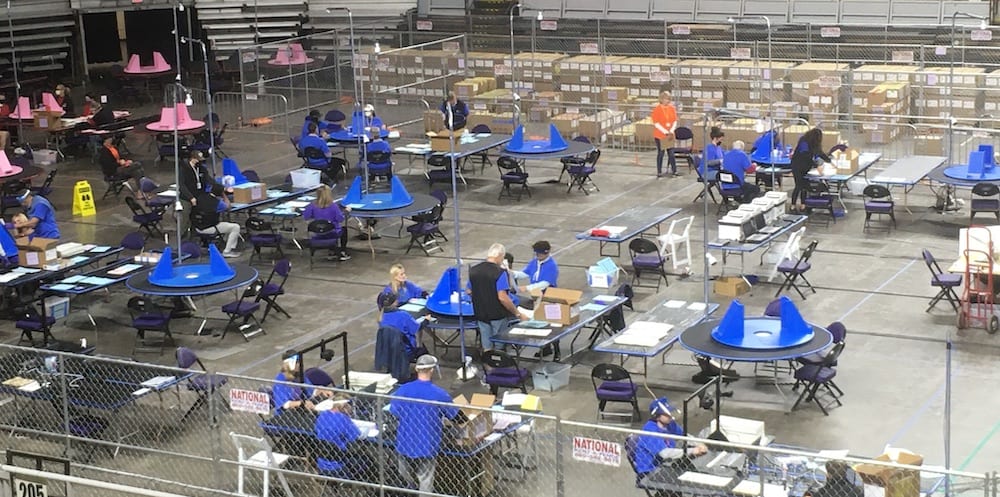
(Photo by Steven Rosenfeld)
Arizona’s Republican-led Senate is looking to expand its post-election audit of 2.1 million ballots in the state’s most populous county while Arizona’s Democratic secretary of state and the U.S. Department of Justice appeared headed to federal court to shut down the post-election exercise.
On Wednesday, May 5, the Senate’s liaison to the audit, former Arizona Secretary of State Ken Bennett, a Republican, confirmed that the GOP-led Senate is negotiating with a California nonprofit to conduct a new and separate audit of Maricopa County’s 2020 fall election votes.
The nonprofit, Citizens Oversight, would conduct an audit based on analyzing the digital images of every paper ballot that is created at the start of the vote-counting process, when election system software reads hand- or machine-marked paper ballots and tallies the vote counts. The nonprofit has been developing its Audit Engine tool for several years and has tested it in a handful of counties in California and Florida and is now using it in Georgia.
“I know our election procedures and overall processes are good enough to prove to somebody if they really lost an election by more than one percent or more, but not by one-third of one percent,” Bennett said. “But that’s not good enough because that’s not precise enough.”
Bennett noted that Donald Trump, statewide, lost to Joe Biden by 10,457 votes and 33,359 ballots contained no vote for president. In addition to the ballot image audit, which would reveal marked ballot ovals skipped by scanners—such as voters who circle ovals instead of filling them in—Bennett said that he wanted to hire a firm to review the digital images of absentee ballot return envelopes to see if any lacked a voter’s signature.
“I think we can exponentially magnify the level of trust in our elections by doing exactly what we’re doing, and even a few things that haven’t even been talked about yet,” he said, adding he expected that this entire exercise would take “two to three months” to conclude.
An expanded and prolonged audit appears to be on a collision course with the U.S. Department of Justice, which, along with Arizona Secretary of State Katie Hobbs, is on the verge of going into federal court to try to shut down the unprecedented post-election audit led by partisans and conducted by private firms that have not been certified by federal election agencies.
On Wednesday, May 5, Hobbs sent a letter to Bennett saying that the audit’s procedures were inconsistent with the protocols laid out in the state’s election procedures, were not being done by “qualified, unbiased counters,” and failed “to adequately protect and document chain of custody of ballots.” These conclusions came from observers sent by Hobbs, who only were allowed into the site after a court ordered the Senate to allow their presence.
At the same time, the Justice Department weighed in on two fronts. In a letter to the Arizona Senate, the Civil Rights Division said the use of private contractors could violate federal law requiring ballots to remain in the control of elections officials for 22 months, the Associated Press reported. And the principal deputy assistant attorney general, Pamela S. Karlan, said that the Senate’s plans to directly contact voters by knocking on their doors and interviewing them could be illegal voter intimidation.
“If Justice can find a federal judge who agrees, they can shut it down,” said Chris Sautter, a Washington-based lawyer specializing in recounts and post-Election Day procedures.
The Eye of a Growing Storm
The AP reported that the DOJ’s “letter came six days after [a coalition of] voting rights groups asked federal officials to intervene or send monitors to the Veterans Memorial Coliseum in Phoenix,” where the audit is occurring under tight security by state police. The groups, led by the Brennan Center for Justice at New York University School of Law, have been very critical of Republican-led efforts across the county to pass new laws curtailing voting options and access to a ballot following the 2020 election.
Inside the arena, two recounting procedures could be seen on Wednesday. The first was a hand recount of ballots, where teams of four or five people would put each ballot on an easel-like rotating stand, mark down which candidate (if any) the vote was for—or whether the voter’s intent was not clear—and then compile a tally sheet. Bennett said that this process was following Arizona’s election procedures manual. However, Hobbs’ letter to the Senate president said that this operation “departs from best practices for accurate hand tallying of ballots.”
“[A]lthough the aggregate totals of at least two tally sheets must match, there is no guarantee that the counters counted all 100 ballots the same way nor is there a reliable process for ensuring consistency and resolving discrepancies,” the letter said.
The second process underway Wednesday was a novel process created by a “failed treasure hunter,” as Georgia Republican Secretary of State Brad Raffensperger’s office put it in January, who has positioned himself as an adviser to Trump-supporting Republicans. Each ballot card is first placed on a tray below a camera, where a high-resolution photograph is taken. Then the same ballot is placed on a second tray where cameras attached to four microscopes take photographs of printer alignment marks, the marked oval, and borders of the ballot card.
John Brakey, an Arizona-based election transparency activist who is a progressive Democrat but has positioned himself as an adviser to Bennett and has been a spokesperson for the audit, said that operation was counting ballots that had been folded as one way to detect forgeries. It was also looking for “bamboo fibers” to prove that 40,000 ballots had been printed in Asia and smuggled into Maricopa County in an elaborate ballot-box stuffing operation—which Brakey said was absurd and lacked evidence, but needed to be disproven.
“The only way you’re going to persuade people on changing [their minds] is having facts, and we’re on a mission for facts,” he said.
In a Tuesday media briefing organized by the National Task Force on Election Crises—a group comprised of 50 experts in election law, administration, security and civil rights—Tammy Patrick, a senior adviser for elections at the Democracy Fund and former Maricopa County election federal compliance officer, said that this line of inquiry was baseless and indicative of an amateur partisan operation.
“There’s an assumption [by the audit contractors] that all vote-by-mail ballots would have a fold, but they don’t,” Patrick said, saying that ballots that are spoiled, such as being torn or stained by coffee, are copied. “That’s also not true for provisional ballots or for someone who votes in person.”
Ballots also are printed on various paper stock and not all at the same time, she said. “There can be some slight variation in the paper, some slight variation in the ink used. But when it comes down to laying forth a narrative to continue to perpetuate all of the [stolen election] falsehoods and [purportedly] missing information, this is where it gets particularly problematic.”
On Wednesday, Bennett said that he joined the audit team after the Arizona Senate president—a position he previously held—hired the initial contractors conducting the audit. He said that he heard and investigated similar conspiracy theories when he was secretary of state, such as false allegations of massive illegal voting by Mexicans crossing the border into Yuma.
“If I, as a public servant, don’t go out and address concerns like that, even some that are crazy—if somebody says there’s bamboo in these ballots, I may think that’s crazy—but if I don’t verify, yes or no, I’m just allowing that [narrative to fester],” he said. “I respectfully disagree with people [whom] I trust or respect [who say] that this process lacks credibility, because, to me, it’s the exact process that we have to go through to rebuild trust in the minds of the half of the people, this year, [who] think the 2020 election was stolen or a fraud.”



